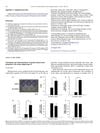 3 citations,
March 2019 in “Fayoum University Medical Journal/Fayoum University Medical Journal ”
3 citations,
March 2019 in “Fayoum University Medical Journal/Fayoum University Medical Journal ” Rubbing calcipotriol on the skin works better than taking vitamin D pills for treating mild to moderate alopecia areata.
 3 citations,
December 2016 in “Journal of epidemiological research”
3 citations,
December 2016 in “Journal of epidemiological research” Estrogen and androgenic hair increase melanoma risk, especially in European-ancestry individuals.
51 citations,
October 2000 in “Acta dermato-venereologica” PPAR alpha may help in hair growth and could be a target for treatment.
 32 citations,
November 2016 in “Journal of Dental Research”
32 citations,
November 2016 in “Journal of Dental Research” Pannexin 3 is important for bone formation and the development of bone cells.
30 citations,
June 2000 in “Journal of dermatological science” Human keratinocytes do not naturally respond to androgens.
 August 2018 in “Journal of the American Academy of Dermatology”
August 2018 in “Journal of the American Academy of Dermatology” Calcipotriol may effectively treat hair loss in alopecia areata, working better in children than adults.
 9 citations,
January 2005 in “Experimental dermatology”
9 citations,
January 2005 in “Experimental dermatology” Melatonin receptors in hair follicles help regulate hair growth and could treat hair loss.
 146 citations,
January 2004 in “Hormones”
146 citations,
January 2004 in “Hormones” Human skin acts like a hormone-producing organ, making and managing various hormones important for skin and hair health.
 April 2018 in “Journal of Investigative Dermatology”
April 2018 in “Journal of Investigative Dermatology” IL-9 increases skin cell movement but decreases their ability to invade, and this effect is controlled by cell contractility, not by MMPs.
 April 2018 in “Journal of Investigative Dermatology”
April 2018 in “Journal of Investigative Dermatology” The conclusion is that a new method combining magnetic tweezers and traction force microscopy may help understand skin cell interactions and diseases.
 January 2011 in “Springer eBooks”
January 2011 in “Springer eBooks” Eating a balanced diet with the right vitamins and minerals is important for healthy hair, but too many supplements can be harmful.
 February 2009 in “Springer eBooks”
February 2009 in “Springer eBooks” Hyperpigmentation is common in pregnancy and may not fully fade after birth; melasma, also frequent, can persist but has limited treatment options during pregnancy.
45 citations,
December 2006 in “Baillière's best practice and research in clinical endocrinology and metabolism/Baillière's best practice & research. Clinical endocrinology & metabolism” Vitamin D and its receptor are essential for hair growth, cell regulation, immune function, and heart health.
 April 2018 in “Journal of Investigative Dermatology”
April 2018 in “Journal of Investigative Dermatology” Nonmelanoma skin cancers have higher levels of certain osteopontin variants than normal skin.
 6 citations,
August 2020 in “Dermatology and Therapy”
6 citations,
August 2020 in “Dermatology and Therapy” People with Alopecia Areata often have lower vitamin D levels, and vitamin D supplements might help treat it.
 79 citations,
January 2017 in “Dermatology practical & conceptual”
79 citations,
January 2017 in “Dermatology practical & conceptual” Correcting nutrient deficiencies may help with hair loss, but the benefits of supplements without a deficiency are uncertain and could be harmful.
 47 citations,
July 2005 in “British Journal of Dermatology”
47 citations,
July 2005 in “British Journal of Dermatology” Topical vitamin D3 does not prevent hair loss from chemotherapy.
 12 citations,
January 2016 in “Journal of Clinical and Investigative Dermatology”
12 citations,
January 2016 in “Journal of Clinical and Investigative Dermatology” Low vitamin D levels are common in people with Alopecia Areata.
 11 citations,
June 2012 in “Journal of Dermatological Science”
11 citations,
June 2012 in “Journal of Dermatological Science” Scientists identified a group of human skin cells with high growth and regeneration potential.
 January 2021 in “Turkiye Klinikleri Journal of Dermatology”
January 2021 in “Turkiye Klinikleri Journal of Dermatology” Many young men with hair loss have low levels of vitamin D and B12.
27 citations,
March 2008 in “Cell stress & chaperones” Localized heat or specific injections can prevent chemotherapy-induced hair loss without affecting cancer treatment.
 3 citations,
February 2008 in “Basic and clinical dermatology”
3 citations,
February 2008 in “Basic and clinical dermatology” Telogen Effluvium is a hair loss condition where treatment involves identifying and managing its triggers.
 305 citations,
February 2007 in “Hormone and metabolic research”
305 citations,
February 2007 in “Hormone and metabolic research” Human skin makes sexual hormones that affect hair growth, skin health, and healing; too much can cause acne and hair loss, while treatments can manage these conditions.
January 1999 in “Birkhäuser Basel eBooks” Metallothionein likely helps in cell growth and development in wool follicles of fetal sheep.

The conclusion is that endocrinology significantly impacts medicine with various common medications used for treatment.
 May 2024 in “International journal of research in dermatology”
May 2024 in “International journal of research in dermatology” Low vitamin D levels are linked to increased risk of male pattern baldness.
11 citations,
January 2018 in “DOAJ (DOAJ: Directory of Open Access Journals)” A 4-year-old boy with a rare type of rickets and hair loss improved in bone health but not hair growth after vitamin D and calcium treatment.
15 citations,
March 2000 in “The journal of investigative dermatology/Journal of investigative dermatology” As skin cells mature, vitamin D receptor levels decrease while retinoid X receptor α levels increase.
 277 citations,
July 2002 in “Molecular Endocrinology”
277 citations,
July 2002 in “Molecular Endocrinology” Removing part of the vitamin D receptor stops vitamin D from working properly.
 81 citations,
January 2006 in “Journal of cellular physiology”
81 citations,
January 2006 in “Journal of cellular physiology” Mice without the vitamin D receptor gene lose hair due to disrupted hair follicle cycles.























